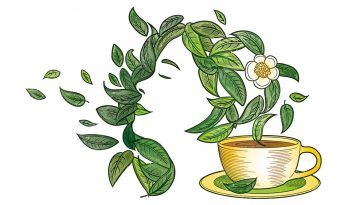Natasha Gilbert in Nature:
 For centuries, people across the globe have testified to the relaxing and invigorating qualities of tea. The traditional calming effects of the plant Camellia sinensis have elevated the drink, which is produced from its leaves, to a role beyond quenching thirst — it is drunk as an aid for meditation, to help soothe the nerves or simply to unwind. But although the mental-health benefits of C. sinensis are common knowledge among tea drinkers, scientists are only now beginning to examine how tea exerts its effects on mood and cognition.
For centuries, people across the globe have testified to the relaxing and invigorating qualities of tea. The traditional calming effects of the plant Camellia sinensis have elevated the drink, which is produced from its leaves, to a role beyond quenching thirst — it is drunk as an aid for meditation, to help soothe the nerves or simply to unwind. But although the mental-health benefits of C. sinensis are common knowledge among tea drinkers, scientists are only now beginning to examine how tea exerts its effects on mood and cognition.
Researchers have found, for instance, that drinking tea lowers levels of the stress hormone cortisol. And evidence of long-term health benefits is emerging, too: drinking at least 100 millilitres (about half a cup) of green tea a day seems to lower the risk of developing depression and dementia. Scientists are also trying to identify the major active compounds that give tea its mental-health benefits, and whether they work alone or in combination with other compounds present in the drink. Tea catechins — antioxidants such as epigallocatechin gallate (EGCG) — account for up to 42% of the dry weight of brewed green tea, and the amino acid L-theanine makes up around 3%. EGCG is thought to make people feel calmer and improve memory and attention when consumed on its own. L-theanine is found to have a similar effect when consumed in combination with caffeine. Up to 5% of the dry weight of green tea is caffeine, which is known to improve mood, alertness and cognition.
The effect of tea on behaviour is slightly paradoxical, says Andrew Scholey, a psychopharmacologist at Swinburne University of Technology in Melbourne, Australia. “Tea is calming, but alerting at the same time,” he says, while sipping a cup of Earl Grey tea.
More here.
